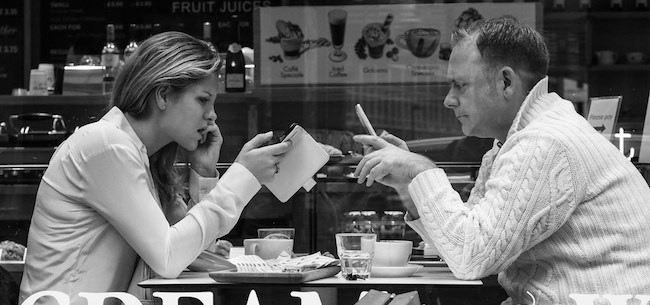Your Phone May Be Impacting Your Relationships More Than You Think
Your Phone May Be Impacting Your Relationships More Than You Think
Wednesday, September 12, 2018

There’s no denying that smartphones help us connect with each other – but they can also keep us from being truly connected. A new study suggests that if you remain “plugged in” to your phone while you’re with someone, there’s a good chance that your time together will less fulfilling than it could have been.
Ryan Dwyer, MA, and colleagues explored the effects of smartphone use by conducting a study with students from the University of Virginia. The study simply had students dining at a restaurant either keep their phones on the table with the ringer or vibration mode on, or put their silenced phones in a container on the table. The researchers found that those whose phones were in the container used the phones less, were less distracted, and enjoyed their dining experience more.
These researchers also surveyed 120 university students five times a day for one week regarding face-to-face interactions. They also found that these students felt less distracted, more engaged, and enjoyed their interactions when they were not using their phones.
These studies showed that even moderate levels of phone use detract from the social interactions. Adding to this concern about phone use, other research has found that pre-teens improved their ability to read the non-verbal cues of their peers after five days of no screen time. (It would be interesting to study whether adults also show improvements in the ability to read non-verbal cues and to connect with others after some time away from their digital devices.)
While it’s easy to draw the conclusion that you can improve your connection with friends and family by putting down your phone, that can be easier said than done. Smartphones can have an incredibly powerful draw, constantly beckoning you with alerts, buzzing and reminders to return to your messages, games, or whatever other excitement and rewards it holds for you.
Instead of allowing yourself to get pulled, unthinking, along in this current of activity, try pausing when you meet up with other people. Step back and ask yourself what you want to do. Do you want to focus on the people in front of you? Do you want to make the best of the time together? Or, is there something more important on your phone? If there is something on your phone that might take priority – such as the possibility of getting a message from your wife that she’s gone into labor – then be sure to keep your phone close. Still, consciously choose to limit the distraction to what is important.
In the end, you have a choice: You can use your phone to facilitate creating a better social life, or you can let it control and distract you even when you are with other people.
Important:
The opinions expressed in WebMD Second Opinion are solely those of the User, who may or may not have medical or scientific training. These opinions do not represent the opinions of WebMD Second Opinion are not reviewed by a WebMD physician or any member of the WebMD editorial staff for accuracy, balance, objectivity, or any other reason except for compliance with our Terms and Conditions. Some of these opinions may contain information about treatments or uses of drug products that have not been approved by the U.S. Food and Drug Administration. WebMD does not endorse any specific product, service or treatment.
Do not consider Second Opinion as medical advice. Never delay or disregard seeking professional medical advice from your doctor or other qualified healthcare provider because of something you have read on WebMD. You should always speak with your doctor before you start, stop, or change any prescribed part of your care plan or treatment. WebMD understands that reading individual, real-life experiences can be a helpful resource, but it is never a substitute for professional medical advice, diagnosis, or treatment from a qualified health care provider. If you think you may have a medical emergency, call your doctor or dial 911 immediately.
